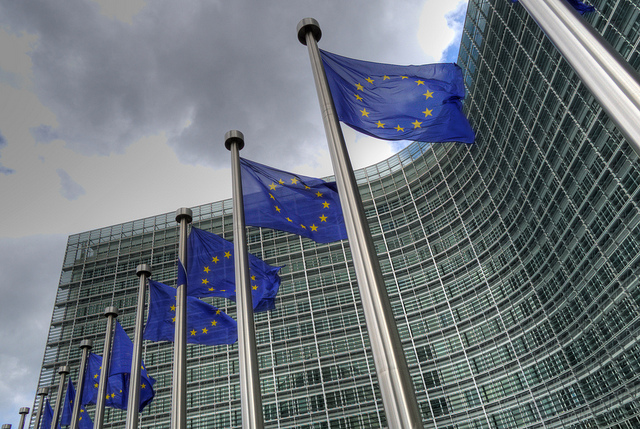In a presentation of the preliminary results of its anti-dumping and anti-subsidy investigation into the import of Chinese solar modules and cells into the European Union (EU), the European Commission has proposed to extend the current tariffs for two additional years once the current scheme expires in March 2017.
This proposed extension, outlined in official documents seen by pv magazine, has provoked dismay among leading solar organizations within the EU, with various stakeholders calling the decision “harmful” and based upon “inaccuracies” in reporting and interpreting the current state of the European solar market.
SolarPower Europe president Oliver Schaefer said that the Commission’s recommendation to maintain the trade measures for another two years is the wrong decision, stressing that the organization will look to the EU Member States to redress some of the inaccuracies reported. “Opening ex-officio interim reviews on the minimum import price mechanism is simply tinkering at the edges of a profound issue of European-wide importance,” Schaefer said.
James Watson, SolarPower Europe’s CEO, added: “This year 36 European solar associations representing 120,000 companies and 1.3 million jobs as well as 407 European companies from all 28 Member States called on the Commission to end the trade measures. The large majority of European stakeholders want to see the removal of the trade barriers. We now hope that the Member States will be supportive of European solar.”
A spokesperson for the Solar Alliance for Europe (SAFE), Holger Krawinkel, weighed in, asking why the European Commission has “ignored the massive disadvantages of many European companies along the solar value chain” and instead “builds a protective fence for a handful of noteworthy module producers”.
Last week, 22 MEPs led by Sweden’s Christoph Fjellner co-signed a letter addressed to the European Commission urging for the tariffs to be dropped next year. EU ProSun, the SolarWorld-backed organization that helped to initiate the introduction of anti-subsidy and anti-dumping duties against Chinese suppliers, called the letter a “senseless assault on EU manufacturing”, with the body’s spokesman Milan Nitzschke stating: “Only fair competition and clear rules enable sustainable market growth. To have the renewable part of the Energy Union rely only on illegal Chinese dumping and the export subsidy politics of the Communist Party in Beijing – as the 22 MEPs implicitly suggest – would be a terrible mistake and put in jeopardy the leading position of the EU in renewable energy technologies such as solar.”
Today, Nitzsche told pv magazine: “EU ProSun welcomes the very detailed analysis of the EU Commission and the conclusion to extend the measures. This will help to continue the process of recovery of one of Europe's key technologies. European manufacturers today are in the leading role for quality, longevity, efficiency and sustainability of solar cells and modules. This may not be allowed to be destroyed by Chinese dumping.”
The EU ProSun spokesman also said that he backs the Commission's suggestion to revise current measures, adding: “Our experience is that the existing design of tariffs and undertaking suffers from a lack of transparency and hard-to-understand bureaucracy.” In order to avoid unreasonable bureaucratic efforts, Nitzschke stressed, the extension of the measures would deliver more certainty to investors.
The EU’s Member States have not yet approved the European Commission’s proposal, and comments on the recommendation are invited by the Commission until January 6, 2017. More than 120 companies and associations in Europe against the extension of the measures are expected to let their feelings be known over the coming weeks. This document is then sent to the Member States for review, prior to the final decision in March.
pv magazine has also learned that the Minimum Import Price (MIP) for solar components and cells entering Europe from China will be lowered from January 1, 2017, falling from €0.56/W to €0.46/W for PV components, and down to €0.23/W for solar cells. This information, from the China Chamber of Commerce for Import & Export of Machinery and Electronic Products, has not yet been made public, but pv magazine understands that the prices will apply for the first quarter of next year.
This content is protected by copyright and may not be reused. If you want to cooperate with us and would like to reuse some of our content, please contact: editors@pv-magazine.com.



1 comment
By submitting this form you agree to pv magazine using your data for the purposes of publishing your comment.
Your personal data will only be disclosed or otherwise transmitted to third parties for the purposes of spam filtering or if this is necessary for technical maintenance of the website. Any other transfer to third parties will not take place unless this is justified on the basis of applicable data protection regulations or if pv magazine is legally obliged to do so.
You may revoke this consent at any time with effect for the future, in which case your personal data will be deleted immediately. Otherwise, your data will be deleted if pv magazine has processed your request or the purpose of data storage is fulfilled.
Further information on data privacy can be found in our Data Protection Policy.